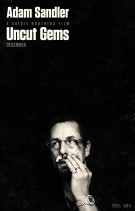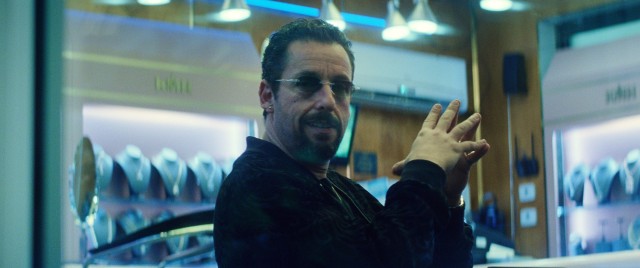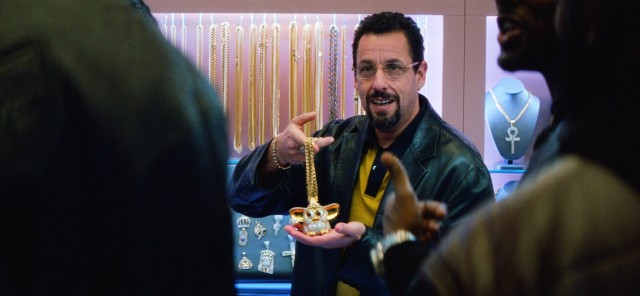Uncut Gems Movie Review
 |
Uncut Gems
Theatrical Release: December 13, 2019 / Running Time: 135 Minutes / Rating: R Writers/Directors: Josh Safdie, Benny Safdie Cast: Adam Sandler (Howard Ratner), Lakeith Stanfield (Demany), Julia Fox (Julia), Kevin Garnett (Himself), Idina Menzel (Dinah), Eric Bogosian (Arno), Judd Hirsch (Gooey), Keith Williams Richards (Phil), Mike Francesa (Gary), Jonathan Aranbayev (Eddie), Noa Fisher (Marcel), The Weeknd/Abel Tesfaye (Himself), Wayne Diamond (Handsome Older Man), Tommy Kominik (Nico), John Amos (Himself), Tilda Swinton (voice of Anna), Glenn "Doc" Rivers (voice of Glenn "Doc" Rivers) |
If you don't know that Adam Sandler can act, then you're not much of a film person. If you're not much of a film person, then Uncut Gems, the latest showcase of Sandler's fine dramatic chops, probably won't do a whole lot for you.
Sandler, long one of Hollywood's biggest movie stars and since 2016 one of Netflix's top draws, has impressed with his performances for Paul Thomas Anderson (Punch-Drunk Love), Noah Baumbach (The Meyerowitz Stories), Mike Binder (Reign Over Me), Now in his fifties, Sandler has made more money than most make in several lifetimes and his Netflix deal spares him some of the critical disdain and box office scrutiny that comes with standard theatrical release. Perhaps because of that, the actor has lately embraced a "one for them, one for me" mentality, except in this case it's not clear which is which. There can be no doubt that Sandler enjoys writing, producing, and starring in his signature comedies with his troupe of regular collaborators. But there are now enough outliers on Sandler's filmography that we must assume he also enjoys stretching and showing different sides of himself for more acclaimed, craft-driven filmmakers.
The latest beneficiaries of that interest are Josh and Benny Safdie, the young writers-directors-brothers whose body of work has raised the degree of awareness awaiting each subsequent effort. Their fifth and prior feature, 2017's Good Time starring Robert Pattinson, won the siblings their biggest audience to date. That film premiered at Cannes and later competed for a slew of Best Actor awards. Sandler is merely the biggest of a number of big names joining them on Uncut, which like Good Time carries the seal of credibility that comes with A24 distribution.
The film's opening sequence, set in 2010, takes us inside the Welo mines of Ethiopia, where a colorful precious rock seamlessly transitions to the colonoscopy of our protagonist Howard Ratner (Sandler). It's the spring of 2012 and New York jeweler Ratner is in a bind, owing thousands of dollars to a number of people who are none too pleased to try to collect from him. Howard has obtained one of the precious Ethiopian opals, which he claims should be valued over one million dollars. That would be enough money to pull him out of the deep debts he has to Arno (Eric Bogosian), a relative by marriage.
Howard's gem attracts the interest of no less than Boston Celtics superstar Kevin Garnett (playing himself). KG wants the rock that strikes him as meaningful after his viewing of it (and the weight of his 7-foot frame) results in the shattering of Howard's display glass. Howard says it's going up for auction, but allows the professional basketball player to hold onto it temporarily in exchange for his 2008 championship ring, which Howard soon pawns.
Garnett's fascination with the gem inspires Howard to place his hopes on Garnett, betting big on the future Hall of Famer in the Celtics' second round playoff series against the eighth-seeded Philadelphia 76ers. Arno and his goons are not okay with Howard's gambling. In fact, no one is really okay with Howard. Not his wife (Idina Menzel), who is only waiting until after Passover to separate from him. Not his kids, whose school play is disrupted by an encounter with Arno's goons (Keith Williams Richards and Tommy Kominik). Not his business associate Demany (Lakeith Stanfield), who isn't thrilled with the way the fake Rolex watches he's procured are being sold.
The only person able to tolerate Howard is Julia (Julia Fox), his attractive young girlfriend and part-time employee occupying the upscale second apartment he has in the city. They clash after Howard sees her getting close to up and coming pop star The Weeknd (also playing himself).
Twenty-five years of mostly playing the goofy hero grants Sandler sympathy in a role that most other actors would lack. He pushes that sympathy to the limits, with Howard's atrocious social skills and endless string of bad decisions. And yet, Sandler and the Safdies give that minor overlap audience much to feast on in this offbeat, immersive, unpredictable, and utterly breathless drama. Sandler's command of the screen is no longer a surprise, but it is still a delight and it's refreshing to see it put to excellent use by filmmakers with their own abundant gifts for the medium. Undoubtedly, this marks Sandler's most cinematic work since Punch-Drunk Love. Whereas that romance had two damaged but beating hearts at its center, this one has a healthy colon inside an irrepressible asshole. In fairness, the world is almost as rotten to Howard as he is to the world. And we can empathize with scenarios that elude his control, like the uncooperative magnetically locked door that delays a meeting with Garnett for an uncomfortable amount of time.
Whereas other filmmakers pick their moments, the Safdies opt to build tension and simply let it fester. Most of Uncut Gems puts a knot in your stomach, even if you remember exactly how the liberally-licensed Celtics-Sixers series played out. We're rooting for Howard to succeed, but also recognizing he's an addict who needs to turn his life around. This is a fascinating antihero who never for a moment seems capable of repairing himself. At best, he's only able to scrape by, overcoming one hurdle at a time mostly with swindles that will come back to bite him.
All of this makes Uncut Gems unusually appealing to critics and almost certain to die at the box office once A24 ventures beyond the two coasts on which the business centers. Movie star clout can help to get a project financed, but it doesn't often seem to make a huge difference on ticket sales. True, Sandler's more artistic-minded films would have made less money with his lead role going instead to one of his fellow '90s Saturday Night Live pals like Rob Schneider or David Spade. But they weren't movies Sandler and their directors made for commerce.
This one clearly isn't either. Good Time grossed just $2 million from 700 domestic theaters and only $4 million worldwide, which are numbers Uncut should have no trouble clearing. And yet no one judges the Safdies' work by those numbers, but by how moved and impressed those in attendance left. By those measures, Uncut is already a success. No matter how its staggered Christmas rollout turns out, the film has already won over critics on the fall festival circut and drawn a host of nominations from the Gothams and Independent Spirit Awards.
This film may be challenging and frustrating, but it is also undeniably fresh and creative, qualities that are all too rare to find at your local theater, particularly now with Netflix taking the biggest risks.
|
Related Reviews:
DVDizzy.com | DVD and Blu-ray Reviews | New and Upcoming DVD & Blu-ray Schedule | Upcoming Cover Art | Search This Site
DVDizzy.com Top Stories:
Now in Theaters: Waves • Marriage Story • The Irishman • A Beautiful Day in the Neighborhood • The Lighthouse
Adam Sandler: Punch-Drunk Love • Funny People • The Cobbler • Pixels | Lakeith Stanfield: Get Out
Written and Directed by the Safdies: Good Time
The Gambler (2014) • A Serious Man
Text copyright 2019 DVDizzy.com. Images copyright 2019 A24 and Elara.
Unauthorized reproduction prohibited.

